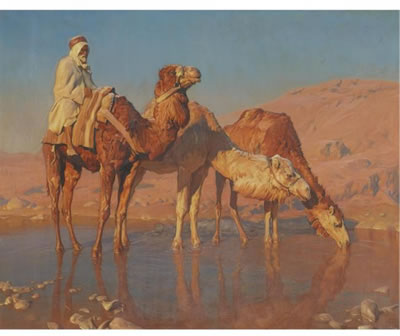The Curious translation of the Two Horsemen, a donkey with a rider, and a camel with a rider.
When he sees riders, horsemen in pairs, riders on asses, riders on camels, let him listen diligently, very diligently.” Is. 21:7
Every English translation that I looked at was similar to the RSV. What the reader of the Bible needs to know is that Hebrew uses plurals very differently than English. For the most part, we just add an “s”; except for some older words of collective nouns such as a flock of birds, a gaggle of geese, a covey of quail, a school of fish, etc. However, in Hebrew, there is a singular and a dual, and the plural means three or more. In this verse, the duel indication is attached to the horsemen (pl.), but for some reason, the translators have attached this dual to all the following nouns. If they were to be attached they should still be dual or plural, but they are singular. So there is only one donkey and one camel.
When he sees two horsemen, a donkey with rider, and a camel with rider, let him listen diligently, very diligently. Is 21:7
Meaning
 The two horsemen were the Roman Empire. Many think the eagle was the symbol of Rome, but it was a horse. The eagle was the symbol of a Legion. Historically, Rome did have two ‘divisions’. The whole empire was originally centered in Rome, but after Constantine, the empire was split with Rome in the West and Constantinople in the East.
The two horsemen were the Roman Empire. Many think the eagle was the symbol of Rome, but it was a horse. The eagle was the symbol of a Legion. Historically, Rome did have two ‘divisions’. The whole empire was originally centered in Rome, but after Constantine, the empire was split with Rome in the West and Constantinople in the East.
We all know the rider of the donkey was Jesus.
“Fear not, daughter of Zion; behold, your king is coming, sitting on an ass’s colt!” John 12:15
The camel was identified by the Rambam as Mohammed. Why he reversed the order of the animals he did not say.
 Similarly, Isaiah intimated that the coming of the Messiah will occur after the rise of the Madman, in the verse “A man riding on an ass, a man riding on a camel, and two men riding on horses.” (21:7). Maimonides the Letter to Yemen Page 33. (Throughout the Letter to Yemen the Rambam calls Mohammed the Madman or in Hebrew, Meshuga.)
Similarly, Isaiah intimated that the coming of the Messiah will occur after the rise of the Madman, in the verse “A man riding on an ass, a man riding on a camel, and two men riding on horses.” (21:7). Maimonides the Letter to Yemen Page 33. (Throughout the Letter to Yemen the Rambam calls Mohammed the Madman or in Hebrew, Meshuga.)
Isaiah 21:1-10
1 The oracle concerning the wilderness of the sea.
As whirlwinds in the Negeb sweep on, it comes from the desert, from a terrible land.
2 A stern vision is told to me; the plunderer plunders, and the destroyer destroys.
Go up, O Elam, lay siege, O Media; all the sighing she has caused I bring to an end.
3 Therefore my loins are filled with anguish; pangs have seized me,
like the pangs of a woman in travail; I am bowed down so that I cannot hear,
I am dismayed so that I cannot see.
4 My mind reels, horror has appalled me;
the twilight I longed for has been turned for me into trembling.
5 They prepare the table, they spread the rugs,
they eat, they drink. Arise, O princes, oil the shield!
6 For thus the Lord said to me:
“Go, set a watchman, let him announce what he sees.
7 When he sees riders, horsemen in pairs, riders on asses,
riders on camels, let him listen diligently, very diligently.”
8 Then he who saw cried:
“Upon a watchtower I stand, O Lord, continually by day,
and at my post I am stationed whole nights.
9 And, behold, here come riders, horsemen in pairs!”
And he answered,
“Fallen, fallen is Babylon; and all the images of her gods he has shattered to the ground.”
10 O my threshed and winnowed one,
what I have heard from the LORD of hosts, the God of Israel, I announce to you.
The horsemen have come and gone. The Messiah came and was rejected. The madman’s teachings are now throughout the earth. It is time to watch.
